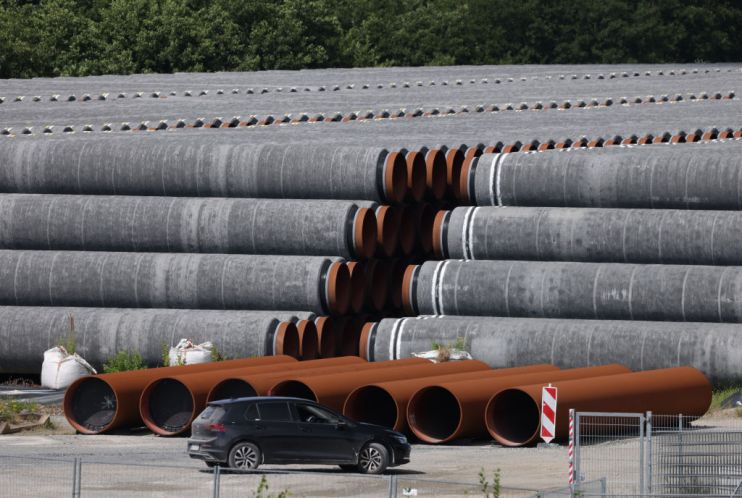EU aims to boost gas supplies amid deepening energy crisis and Russia-Ukraine tensions

The European Union (EU) is talking with partners about potential ways to boost gas supplies to the bloc, amid a deepening energy crisis across the continent and rising geopolitical tensions.
Kadri Simson, European commissioner for energy, has held informal council meetings with European energy ministers in France to discuss solutions to rising energy prices and the gas supply shortages.
Simson has since revealed she would attend conferences in Azerbaijan and Washington in February to try and make deals that could increase gas deliveries to Europe.
She recognised that gas storage levels across the EU are “significantly lower” than usual at this time of year, but remained defiant that the continent would continue to provide sufficient energy for European households.
She also called on her European allies to be vigilant and remain united in the face of future market shocks.
The commissioner told reporters: “My message is that Europe has a robust, well diversified and resilient gas infrastructure and clear procedures of solidarity in case of emergencies. But we need to remain extremely vigilant, improve our risk-preparedness and reinforce solidarity between the member states.”
Last month, the commission proposed potential revisions to gas supply regulations to improve coordination among member states over gas storage.
The objective is to ensure both a more efficient use of storage capacities and adequate gas storage levels ahead of the continent’s planned transition to renewables.
The energy crunch in Europe has been caused by multiple factors such as faults at key nuclear power facilities in France, and rebounding demand following multiple lockdowns, with wholesale costs increasing fivefold over the course of 2021.
Soaring wholesale costs have also been widely blamed on a dearth of gas flows from Russia.
This has contributed to market shocks across Europe, with 25 energy suppliers collapsing in the UK since last September, directly affecting four million domestic households.
Russia has denied accusations from the International Energy Agency that it has been throttling supplies to put pressure on Europe to approve the Nord Stream 2 pipeline, which still awaits certification from Germany’s regulators.
The already constructed £8.4bn project would double Russia’s gas exports to Germany, with Europe already relying on Russia for around 35 per cent of its natural gas supplies.
The Kremlin has consistently dismissed these claims, with Russian president Vladimir Putin previously dismissing the accusations as “politically motivated blather’.
He has instead pointed to problems at the pumps, general supply shortages and European energy policy, which he argued has lacked both sufficient hedging and storage, and relied too much on renewable sources.
Europe’s gas storage levels are below the five-year average, with buyers now encouraged to push for withdrawals of gas from stocks rather than paying higher prices for Russian supply.
However, the crisis has been exacerbated by Gazprom, which has cut its export growth into Europe to as little as five per cent, while also seemingly missing its supply targets for Europe and Turkey over the past year.
A flotilla of US tanks was instead required to bolster European supplies and stave off the threat of potential blackouts with both Kosovo and Moldova reporting power shortages in recent weeks.
Nevertheless, the Kremlin-backed gas giant has said it has honoured all of its agreed contracts with European partners.
It has also warned Europe not to delay approval of the Nord Stream 2 pipeline unnecessarily, with the project unlikely to be greenlit by the Germans until the summer at the earliest.
Fears of Russia-Ukraine conflict escalate with no breakthroughs in talks with the Kremlin
Chancellor Olaf Scholz has signalled this week that Germany may be ready to discuss halting the Nord Stream 2 pipeline should Russia attack Ukraine
Russia is particularly focused on the pipeline as it would reduce Ukraine’s influence over the energy market, with the country picking up transit fees from gas flowing through its country.
Over the past two months, it has positioned over 100,000 troops in close proximity of Ukraine’s borders, escalating fears of a potential invasion of the country.
Talks between the White House and Russia have so far proved fruitless, with Moscow still pushing for NATO to withdraw troops from countries bordering its country, and the West remaining committed to protecting agreements with Ukraine and Eastern European allies.
Foreign secretary Liz Truss has warned Russia should “step back” from invading Ukraine or risk becoming embroiled in a “terrible quagmire”, in a speech in Sydney on Friday.
She has also claimed that British intelligence discovered a plan by Russian President Vladimir Putin to install a pro-Moscow puppet leader in Ukraine.
However, Deputy Prime Minister Dominic Raab has ruled out the UK putting boots on the ground, a position in line with the US.
The West is instead considering economic sanctions it can place on Russia if it attacks Ukraine.
According to The Financial Times, the US has also been holding talks with Qatar and other large gas exporters to plan contingency measures in case a Russian invasion of Ukraine further disrupts supplies into Europe.
The talks with Qatar and EU member states have focused on securing additional seaborne liquefied natural gas cargoes to head off the risk of future blackouts.

Meanwhile, gas flows on the Yamal-Europe pipeline have now moved eastwards towards Russia for over a month, according to the latest data from German network operator Gascade.
The Germany to Poland pipeline, which usually sends Russian gas west into Europe, has been sending supplies away from the continent since December 21.
The pipeline usually accounts for about one-sixth of Russia’s annual gas exports to Europe and Turkey.
The shortfall in supplies has put upward pressure on the Dutch futures benchmark, which has risen again after declining over recent weeks.
The reverse flows seen on Sunday morning were slightly above 11.4 million kilowatt per hour, according to data from the Mallnow metering point on the German-Polish border.
It is now expected to stay at this level until the early hours of Monday.